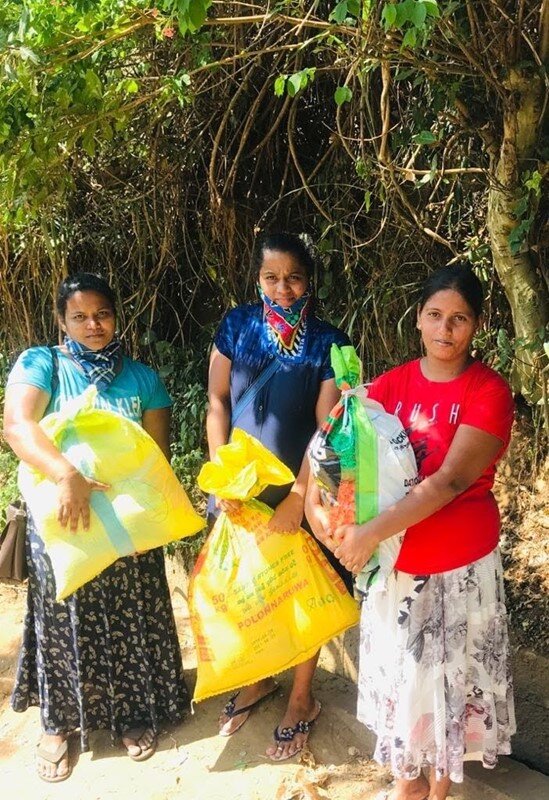IWD Meet the Makers Special: Child Action Lanka
Throughout March, we are marking International Women’s Day by focusing on the women who make our gifts.
A few months ago, we introduced you to Florence, Lorna and Mary, who live in a remote region of Kenya and craft the juggling balls we sell.
Today, we travel to Sri Lanka to meet the women who make our sari balls, newspaper pencils and purses. Debbie Edirisinghe is Founding Director of Child Action Lanka (CAL). The charity rescues children off the streets and helps them and their families to break the cycle of poverty. In addition, Debbie and her team give refuge to women who are victims of domestic abuse and need a safe place to go with their children.
International Women’s Day is a celebration of the social, economic, cultural and political achievements of women all around the world. It also serves as a rallying cry for gender parity, and meeting our makers in Sri Lanka brings home just how important it is to keep talking about women’s struggle for equality.
We asked Debbie to tell us what life is like for the women they take care of:
EA: How many women are at the safe house and how long (generally) do they remain?
DE: The numbers vary from time to time (anywhere between 5 and 10) with women being sent from courts, hospitals, social services etc… we generally try to help them get back on their feet within 3-6 months. However, in some instances when the situation is really bad and security is an issue they do remain for as long as a court case exists or for as long as it may not be safe for them to be on their own.
EA: Where in Sri Lanka are the women based? Can you describe the environment?
DE: The location is in the central province … [and] kept discreet due to the security that the women need. It’s a beautiful serene house with lots of space and nature.
EA: What is daily life like for the women – from morning until night (do they cook and eat together); what are their responsibilities?
DE: They are all on rosters and share responsibilities of cooking, cleaning, taking care of kids and in some cases infants. Some are taken for legal assistance, medical care, counseling and therapy depending on their need. They have a time of relaxing, watching television, sharing thoughts and discussions, as well as production that helps income generate both for themselves and towards the expenses of the refuge.
EA: How does CAL/ the refuge/ their work make a difference to them?
DE: CAL is able to maintain the relationship with the women after they leave as we have centres across the island. Women … are provided with the necessary skills, jobs and support to do so by CAL. Their children often continue to attend a CAL centre making it a good way for us to maintain the relationship and make sure the women are doing ok.
EA: What is it like when the women work together – can you describe in a sentence or two what the atmosphere is like?
DE: Tough! It’s bringing many broken pieces together. Hurting people hurt others… this is often the case, jealousy and mistrust are all issues that we keep having to deal with.
EA: What materials are the products made from?
DE: Paper, cardboard, fabric, leather, beads, fruit, vegetable, etc.
EA: How have CAL/the women (and their children) been affected by COVID-19?
DE: Domestic violence has skyrocketed, mental health and suicide have been huge challenges. Being locked down as a victim with the abuser is awful. CAL has had to take in children and provide them with residential care owing to COVID-19. And that’s new. We’ve never done that in our 15 year history. It’s a new learning curve… and we are learning on the job!
EA: Are there any individuals who you’d like to shine the spotlight on?
DE: Nirmala* (name changed) was a young woman who came to teach at our centre. Having been widowed at the age of 23 and three months pregnant, she never quite got over the sudden loss of her husband. Over Covid when the kids were in residential care and the refuge needed help with more victims being sent, Nirmala sacrificed her own trauma and sorrow, brought her little son and came to offer care alternately to the women in the refuge and the kids in shelter care.
As she is new to this field she struggles but finds courage to put her own troubles aside and take care of those she feels have a bigger need. We so deeply appreciate her commitment as she smiles between her own tears to offer courage to those she wants to be a shoulder to cry on.
*She doesn’t want her picture sent ( which is so typical of her – never wanting any limelight)
Debbie and her team do amazing work to help the women recover from their individual traumas: they work through past events and enable them to move forwards. They offer the women protection and all the practical and emotional support they need in order to rebuild their lives.
By crafting the sari balls, newspaper pencils and purses, the women’s self-esteem grows; they earn an income, and they learn life-changing skills. The items they make are much more than gifts; they empower the women and give them hope.
At a time when cases of domestic abuse have increased, every single purchase makes a difference.
As CAL quotes: “In a gentle way, you can shake the world.” Mohandas Gandhi
With huge thanks to Debbie Edirisinghe, and we wish you all a very Happy International Women’s Day 2021!



